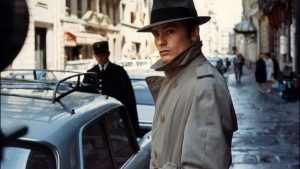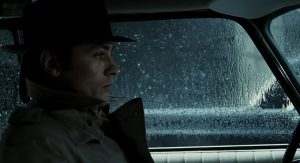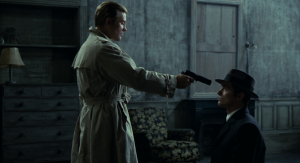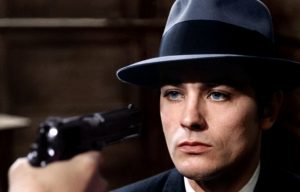
At its core, “Le Samouraï” is a simple crime film centered on a hitman whose life is spiraling out of control. Said hitman is Jef Costello (Alain Delon) and he’s arguably the best around. His precision is unmatched, including airtight alibis and a smooth skill set replete with marksmanship and carjacking. He’s the prototypical hitman we think of nowadays: a smooth criminal with boyish good looks and an icy demeanor. He rarely talks, letting his eyes and body language speak for him. His taciturn attitude is beguiling, causing one to wonder how and why he’s in this line of work. Surely a man with ravishing good looks and intuitiveness could and would find a better lifestyle. The mystery of his vocation is so spellbinding that it’s been duplicated in other excellent crime thrillers, such as Walter Hill’s “The Driver” and Nicolas Winding Refn’s “Drive.”
The actual mystery comes from whom set up Costello following a nearly botched hit. While the act was successful, Jef got picked up for questioning, a grave sin in the crime syndicate. His alibi, once so airtight, has holes in it that, even after being set free, causes the police to remain hot on his tail. When he slithers into the shadows of a subway overpass to retrieve his pay, the hitman is shot for his troubles. Who amongst his employers put a hit out on him and how long until the police dismantle his alibi and bring him into custody? Furthermore, how far will Jane Lagrange (Nathalie Delon) go in covering for him and just why did an eyewitness, Valérie (Cathy Rosier), cover for him?

The suspense comes from watching a once calm and collected hitman slowly lose his cool. At the outset, we see Costello puffing on a cigarette in bed, comforted by the sanctuary of his single-room Parisian apartment. As he lies in content, the following text appears on screen:
“There is no greater solitude than that of the samurai unless it is that of the tiger in the jungle… Perhaps…”
— Bushido (Book of the Samurai)
The world is Jef Costello’s jungle and we are all but guests in it. He notices us not when he prowls into the streets of Paris, our presence only being detected when he’s on the lookout. The first action we see him commit is carjacking. He is unnoticeable to the naked guy, slinking into a car and finessing with the engine without the slightest of hesitation. The only movement he makes is with his eyes, surveying the town in rapid flashes. If there is a better representation of calm under pressure, I haven’t seen it. Later on, however, that tranquility is but a distant memory, replaced by palpable anxiety. Jef fidgets in his seat as he attempts to escape his assailants via carjacking. He is noticeably shaken, a shock to the system. He is no longer the tiger in the jungle, but the deer of prey; no longer the samurai, but a meek peasant.

Underneath the surface lies a clever deconstruction of the crime formula and masculinity. Most crime thrillers of this nature have zippy pacing and razor-sharp tension to strangle the viewer’s attention. Jean-Pierre Melville’s approach is the exact opposite. The pacing is slow and methodical, the attention more focused on the mundane tasks associated with Jef’s line of work than the ferocity of the assassination. The tension is rather subdued, relying on intimacy and body language to convey suspense. Take for instance the scene in which Jef hides away in Jane’s apartment. The usual development of tension would be quick cuts of cops purveying the streets just outside the window, Costello peeking out as sweat drips from his temple. Here, the sound of police skittering is hushed, François de Roubaix’s somber score setting the mood without being overt. The tension comes from the way the two look into each other’s eyes, their collective fear bringing about a strange sense of comfort. The tension only grows from there, as the perfectionist hitman feels his world caving in the closer his adversaries get to him. It is all told through quiet moments, the attachment the audience develops for the French samurai heightening the thrills.
Melville also sneaks in subtle commentary on police corruption. It seems blunt at first, what with Le Commissaire (François Périer) blackmailing Jane into helping him nail Jef and evading police procedure in order to appease his self-fulfillment. The subtlety comes in the form of the editing, which coyly details the similarities between the government and the criminal underbelly. At one point, we see Costello’s employers shoved into a cramped room, detailing their distress over their client’s inadequacies. As they cook up a scheme for revenge, we cut to Le Commissaire doing the exact same thing. He too is shuffled into a cramped room with his comrades, planning out their next move. Both sides are curbing the law for selfish gains. What is subtle about this edit is how intricately framed it is. Both the gangster and the officer are posited exactly in the same position, including having an underling to their far right. The transition is seamless, causing the viewer to fail in differentiating the two organizations. In this moment, both the police and the criminals are one in the same.

Henri Decae’s cinematography helps set the mood. The first half presents the lovely city of Paris rather barrenly. This is to match Jef’s viewpoint, which is that Paris is but an afterthought to him. He owns the city, not the other way around. As his descent into madness overcomes him, the scope of the city is grander. Low angle shots give off the feeling that Paris is towering over the hitman, trapping him as his alibi has done. Soothing blues are instilled early on to give the feeling of serenity, with greys incorporated later on to highlight the murkiness.
It is amazing how much Melville gets out of so little! In the grand scheme of things, not much occurs in the film. Costello operates his task, is questioned by the police, is double-crossed by his employers, goes into hiding, and sets out a plan to save himself from both parties. It’s a tried and true formula, but without the pizazz. The despondent approach can be maddening at times. And yet, it effectively captures the protagonist’s mentality. The grounded nature not only complements the downcast lifestyle of a hitman, but bolsters the impact of the action. When gunfire is dispensed, it jolts the senses. When Jef is eluding the police, the intensity is gripping. These rather conventional tactics are riveting due to Melville’s muted direction.

“Le Samouraï” is a masterclass of filmmaking! Each proponent is on point: the muted direction and screenplay (which Melville co-wrote with Georges Pellegrin) matches the methodical protagonist, magnified only when his anxiety is. The performances are stellar, astutely utilizing body language to convey drama. The cinematography corresponds with the tone as opposed to going for needless exquisiteness. The score is as quiet as the proceedings. All of these combine to make for a captivating experience!
Final Rating: A
